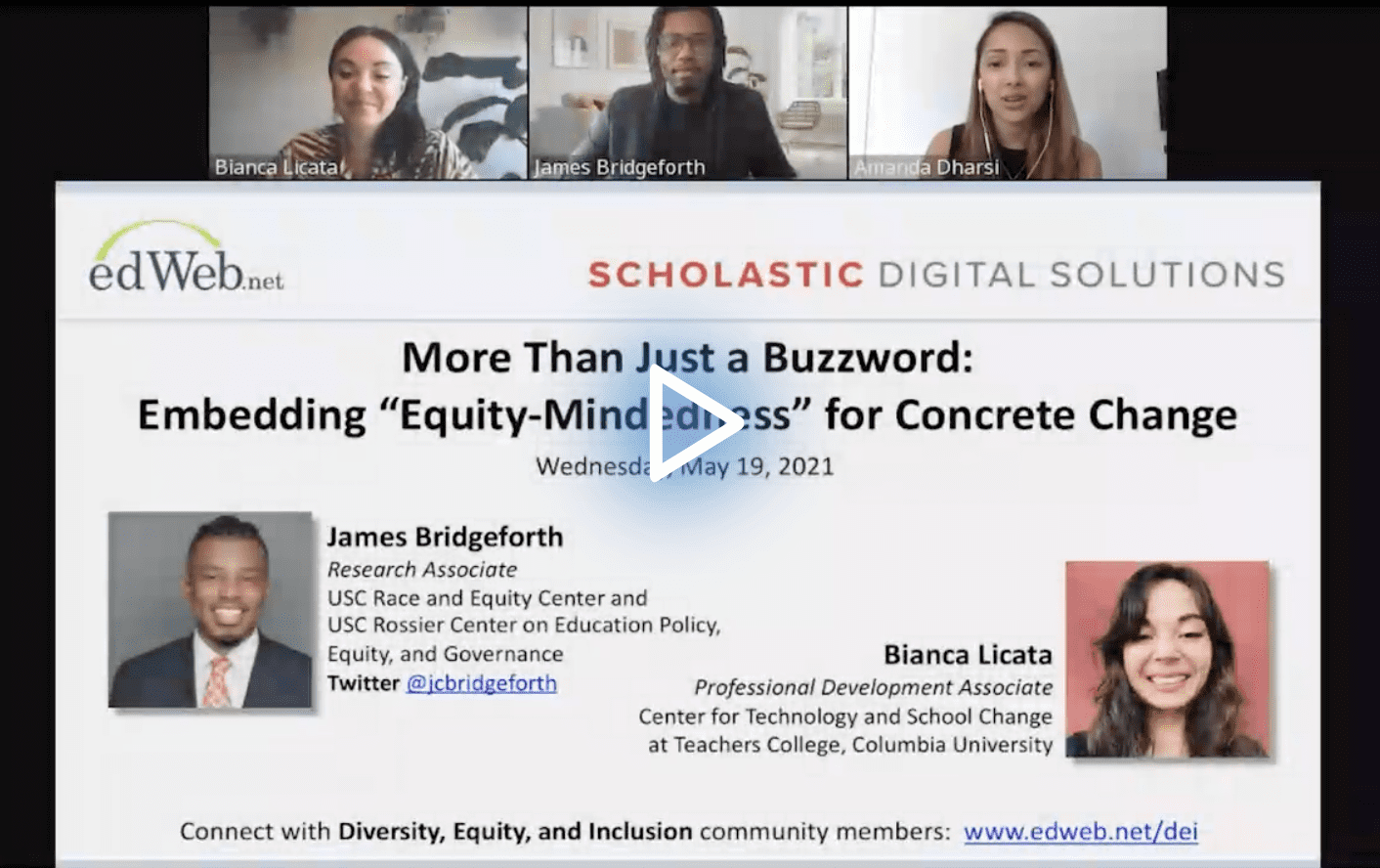Embedding “Equity-Mindedness” for Concrete Change
In a recent edWebinar, sponsored by Scholastic Digital Solutions, the presenters discussed the reality of racial violence and inequity that students of color face and what we as educators and administrators can do to confront it rather than perpetuate it. They identified racial violence as violence incurred by students of color that can be overt and covert, taken for granted, an act of invisibilization, or the erasure of students’ identities and realities.
Issues of racial violence are raised when students and their families are told that what they encounter is not accurate, their experience was imagined, or they are too sensitive or too angry. In a UCLA report from 2020 titled Lost Opportunities, the UCLA Civil Rights Project found that Black students lose 103 days per 100 students enrolled, 82 more days than the 21 days their White peers lost due to out-of-school suspensions. As of July 2020, not one state had met the requirements of the Every Student Succeeds Act (ESSA) of 2015, which explicitly requires states to annually report collected school policing data in annual state and district report cards. This data suggests an epidemic of pro-carceral anti-Blackness in education that does not seek resolve in some districts.
Critical Race Theory, or CRT, is a lens that districts can use to understand why students’ invisibilization, delegitimization, and incarceration continue to exist. First, CRT posits that racism is constructed and normal, meaning it is woven into our everyday systems. Second, it argues that this racism creates a social, political, and economic inequity that benefits White people. CRT also argues that surface-level change, such as adding a story about a person of color to the class library, celebrating Hispanic heritage for one day, or hiring a person because they are people of color, is harmful. A Band-Aid over a much more complex problem requires a deeper dissection of inequitable policies and practices.
Furthermore, the presenters explain that saying that you are “colorblind” erases the authentic racialized experiences many people of color face and prevents critical conversations from taking place. Storytelling is crucial to systemic change, and educators need to listen to the realities our students of color face and center their stories, joys, and experiences as valuable and essential knowledge.
As defined by the USC Race and Equity Center, equity is crafting solutions that meet the needs of diverse groups based on their histories and access to resources. According to the presenters, equity-mindedness is a concept that allows us to realize and concretize racial equity within education. The idea requires districts to understand that institutional racism and power asymmetries have real impacts on racially minoritized students. Focusing on the institution itself rather than putting the burden and blame on students’ racial, ethnic, or cultural identities, and self-reflection on roles and responsibility can go a long way in eradicating inequalities in students’ experiences and outcomes.
Equity-mindedness in K-12 education must be about collaboratively working with institutional stakeholders to decenter Whiteness, dismantle oppressive policies and practices, and rebuild new systems that work for racially minoritized students. It ensures that the students who have the most needs get access to the resources, the opportunities, and other things they need to succeed.
Finally, the presenters emphasized that equity and honesty are inextricable. We, as educators, must understand our history and be able to use that to move our society forward. James Bridgeforth, who is a research associate at the USC Race and Equity Center and USC Rossier Center on Education Policy, Equity, and Governance, stated, “It is essential now more than ever to make sure that we do whatever we can to…include the voices and the lived experiences of every single person, of everybody’s history. If we do not do that, we are doomed to commit some of these same mistakes that we are continuously making, and we’ve been making.”
This edWeb broadcast was sponsored by Scholastic Digital Solutions.
Watch the Recording Listen to the Podcast
About the Presenters
James Bridgeforth is a research associate at the University of Southern California (USC) Race and Equity Center and the USC Rossier Center on Education Policy, Equity, and Governance. He is also a Ph.D. student at the Rossier School of Education at USC. James began his professional experience in education as a college admissions officer and later transitioned to K-12 education as an elementary school teacher in both traditional public and charter schools. James earned his master’s degree in educational administration and policy from the University of Georgia and bachelor’s degrees in political science and sociology from Georgia College & State University.
Bianca Licata is a professional development associate at the Center for Technology and School Change at Teachers College (TC), Columbia University. She is also an Ed.D. student in the Department of Curriculum & Teaching at TC. Bianca taught high school and middle school English, and now teaches writing at Manhattan Marymount College and summer courses at TC. Her research explores how teachers and students construct identities that resist oppressive policies and asks how teacher-student collaboration can build more just systems within schools. Bianca earned her master’s degree in teaching from the University of San Francisco, and her bachelor’s degree in English from the University of Santa Barbara, California.
Join the Community
Diversity, Equity, and Inclusion is a free professional learning community on edWeb.net for educators to collaborate around creating equitable learning environments in schools and districts, and for remote learning.
At Scholastic, we believe in empowering children to thrive in school and in life. That’s why we created literacy solutions that meet each child where they are and ensure that they learn the skills and build the knowledge necessary for their literacy journey. Our digital programs offer thousands of high-quality ebooks and research-based literacy tools that can be accessed in school, at home, or on the go. From transformative instruction to expert professional development and groundbreaking family and community engagement, we are with you every step of the way on the path to literacy.
The summary of this presentation was written by Eileen Belastock.
Eileen Belastock, CETL is the Director of Technology and Information for Nauset Public Schools, MA, and also works with edWeb.net to write articles on their professional learning edWebinars. You can follow Eileen on Twitter @EileenBelastock.




Comments are closed.